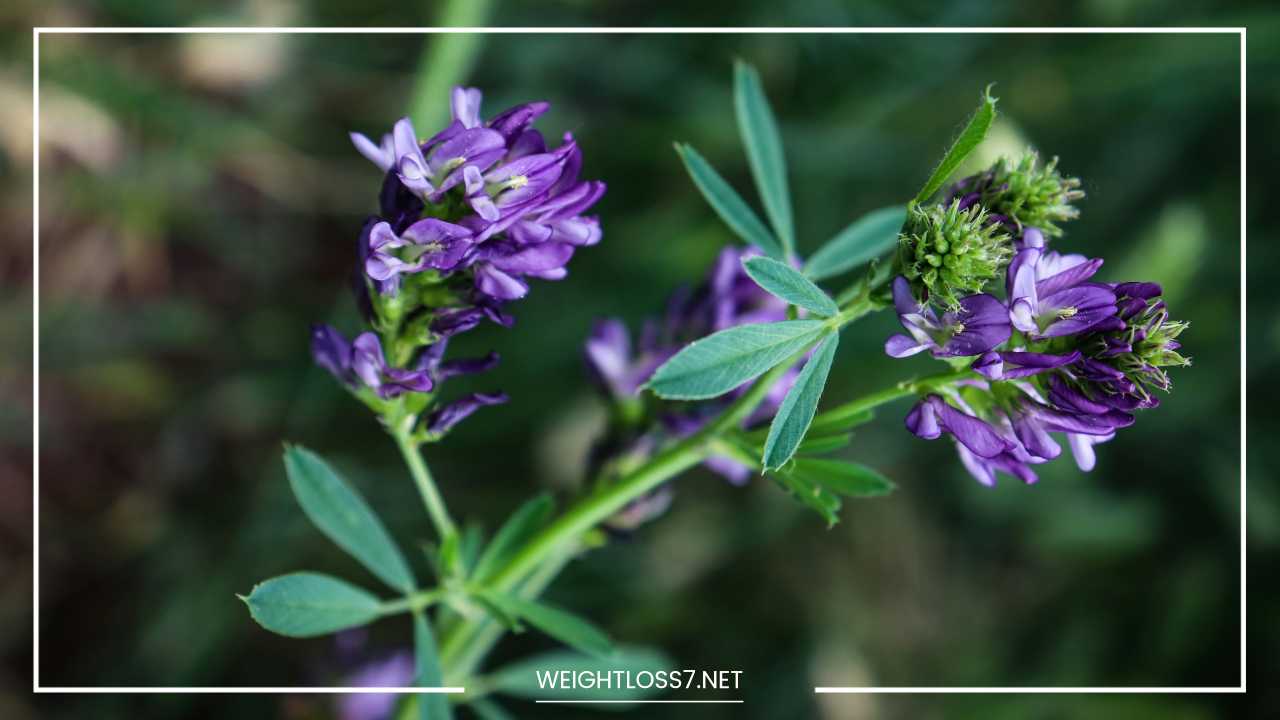Alfalfa Herb Use and Health Benefits

Alfalfa
Alfalfa Herb: A Deep Dive into a Nutritional Powerhouse with Potential Health Benefits
Alfalfa, a seemingly ordinary leafy green herb, boasts a rich history and a potential to positively impact human health.
Often relegated to the realm of animal feed, alfalfa has garnered increasing attention in recent years for its unique nutritional profile and potential health benefits.
This comprehensive blog post delves into the world of alfalfa, exploring its historical significance, various uses, the science behind its potential health benefits, and safety considerations.
By the end of this exploration, you’ll have a well-rounded understanding of this versatile herb and how it might integrate into your well-being journey.
A Legacy Rooted in History: Unveiling Alfalfa’s Origins
The journey of alfalfa stretches back millennia. Evidence suggests its cultivation in Central Asia as early as 8000 BC.
The Medicago sativa plant, belonging to the pea family (Fabaceae), thrived due to its ability to fix nitrogen in the soil, a valuable characteristic for maintaining soil fertility.
From its Central Asian origins, alfalfa spread westward along trade routes, reaching Europe by the 5th century AD.
The Arabs, recognizing its agricultural value, introduced it to North Africa and Spain. Alfalfa’s journey continued across the Atlantic with European colonists, finding a new home in the Americas in the 17th century.
Today, it’s cultivated worldwide as a primary forage crop for livestock due to its high protein content and impressive nutritional profile.
Beyond the Field: Exploring the Diverse Uses of Alfalfa
While its primary role lies in animal agriculture, alfalfa’s potential extends far beyond the field. Its leaves, seeds, and sprouts offer a unique opportunity to incorporate this nutrient-rich herb into the human diet. Here’s a closer look at the various ways alfalfa finds its way onto our plates:
- Fresh Sprouts: A popular addition to salads, sandwiches, and wraps, alfalfa sprouts boast a mild, slightly nutty flavor and a satisfying crunch. Homegrown using readily available sprouting kits, these miniature powerhouses offer a concentrated dose of nutrients in a convenient form.
- Dried Leaves: Often used in teas and infusions, dried alfalfa leaves offer a concentrated source of vitamins, minerals, and bioactive compounds. Steeped in hot water, they create a light and refreshing herbal tea with a subtle grassy flavor. Dried leaves can also be ground into a powder for incorporation into smoothies or sprinkled over yogurt and oatmeal.
- Supplements: For those seeking a convenient way to include alfalfa in their diet, various supplement options are available. Alfalfa supplements come in capsule, powder, and tablet forms, allowing for easy integration into daily routines.
Unveiling the Nutritional Powerhouse: A Look at Alfalfa’s Composition
Alfalfa’s reputation as a nutritional powerhouse is well-deserved. This low-calorie food packs a punch when it comes to essential vitamins and minerals. Let’s delve deeper into its impressive nutritional profile:
- Vitamins: Alfalfa boasts a rich tapestry of vitamins, including vitamins A, C, E, and K, along with essential B complex vitamins like folate, thiamine, and riboflavin. These vitamins play crucial roles in various bodily functions, including immunity, vision, energy production, and cell health.
- Minerals: This herb is a treasure trove of minerals, including calcium, potassium, phosphorus, iron, and magnesium. Calcium is essential for bone health, while potassium helps regulate blood pressure. Phosphorus supports healthy bones and teeth, and iron is vital for oxygen transport in the blood. Magnesium contributes to muscle function, nerve transmission, and energy production.
- Fiber: Alfalfa is a good source of dietary fiber, which promotes gut health, aids digestion, and can contribute to feelings of satiety.
- Saponins: These plant compounds found in alfalfa have been linked to potential health benefits, including cholesterol reduction. Saponins may bind to cholesterol in the digestive tract, hindering its absorption into the bloodstream.
- Bioactive Compounds: Alfalfa contains a variety of bioactive compounds, including alkaloids, flavonoids, and phytoestrogens. These compounds are currently being researched for their potential health benefits, such as antioxidant and anti-inflammatory properties.
Important Note: The exact nutrient content of alfalfa can vary depending on factors like soil conditions, growing practices, and processing methods. Opting for organic alfalfa whenever possible can help ensure a higher nutrient content and minimal exposure to pesticides or herbicides.
Exploring the Potential Health Benefits of Alfalfa: A Look at the Science
While more research is needed to fully understand the extent of its health benefits, alfalfa has been associated with several promising effects on human health. Here’s a closer look at some of the potential benefits currently being investigated:
- Cholesterol Management: Studies suggest that alfalfa saponins may play a role in lowering LDL (“bad”) cholesterol levels. A 2010 study published in the journal “Nutrition Research” found that consuming alfalfa leaf powder for eight weeks led to a modest decrease in LDL cholesterol levels in participants with hyperlipidemia (high cholesterol). However, more robust clinical trials are needed to confirm these findings and determine the optimal dosage for cholesterol management.
-
Blood Sugar Control: The fiber content of alfalfa may contribute to regulating blood sugar levels. Fiber slows down the absorption of carbohydrates in the digestive tract, preventing blood sugar spikes after meals. Animal studies have shown promise in this area, but human trials are necessary to solidify the evidence for blood sugar control in individuals with diabetes or prediabetes.
-
Menopausal Symptoms: Some research suggests that alfalfa, containing phytoestrogens, may offer relief from some menopausal symptoms like hot flashes and night sweats. Phytoestrogens are plant-based compounds with a weak estrogenic effect. The theory is that these compounds may help alleviate menopausal symptoms by mimicking the effects of declining estrogen levels in the body. A 2013 review published in “Menopause: The Journal of The North American Menopause Society” analyzed existing studies and concluded that while some studies showed promise, the overall evidence for alfalfa’s effectiveness in managing menopausal symptoms was inconclusive. More high-quality research is needed in this area.
-
Digestive Health: The fiber in alfalfa can promote regularity and overall gut health. Fiber helps bulk up stool and promotes smooth passage through the digestive system. Additionally, fiber may serve as a prebiotic, feeding beneficial gut bacteria that contribute to a healthy digestive microbiome.
Important Disclaimer: It’s crucial to remember that the research on alfalfa’s health benefits is ongoing. While these potential benefits are promising, more high-quality clinical trials are necessary to confirm their efficacy and establish safe and effective dosages.
Always consult with a healthcare professional before using alfalfa for any medicinal purpose, especially if you have underlying health conditions or take medications.
Alfalfa and Safety: Important Considerations
While generally safe for most people in moderate amounts, alfalfa may not be suitable for everyone. Here are some safety considerations to keep in mind:
- Autoimmune Diseases: Alfalfa may stimulate the immune system, potentially worsening autoimmune conditions like lupus or rheumatoid arthritis. Individuals with autoimmune diseases should consult their doctor before consuming alfalfa.
- Blood Thinning Medications: Alfalfa may interfere with blood clotting due to its vitamin K content. Vitamin K plays a crucial role in blood clotting. If you take blood-thinning medications like warfarin, avoid consuming alfalfa as it can potentially reduce the effectiveness of your medication.
- Pregnancy and Breastfeeding: Due to a lack of sufficient research on the safety of alfalfa during pregnancy and breastfeeding, it’s best to avoid it altogether during these times.
- Kidney Conditions: Alfalfa may increase urine output, potentially affecting those with kidney problems. Individuals with kidney issues should consult their doctor before consuming alfalfa.
If you have any underlying health conditions or are taking medications, consult your doctor before consuming alfalfa to ensure its safety for you.
How to Incorporate Alfalfa into Your Diet: Enjoying the Benefits
If you’re interested in exploring alfalfa and its potential health benefits, here are some ways to add it to your diet safely and enjoyably:
- Sprouting: Growing your own alfalfa sprouts at home using readily available sprouting kits is a convenient and cost-effective way to incorporate this nutrient-rich food into your diet. Enjoy them fresh in salads, sandwiches, or as a topping for soups and stews.
- Incorporating into Smoothies: Add a teaspoon of dried alfalfa powder to your morning smoothie for a hidden dose of nutrients. The mild flavor of alfalfa blends well with other smoothie ingredients like fruits, vegetables, and yogurt.
- Teas and Infusions: Steep dried alfalfa leaves in hot water for a light and refreshing herbal tea. You can also combine alfalfa with other complementary herbs like peppermint or chamomile for a unique flavor profile.
- Culinary Creativity: Explore incorporating alfalfa into various dishes. Finely chopped dried alfalfa leaves can be sprinkled over soups, salads, yogurt parfaits, or even omelets for an added nutritional boost.
Remember, moderation is key. Start with a small amount of alfalfa and gradually increase intake as tolerated. Listen to your body and pay attention to any potential side effects. If you experience any discomfort, discontinue use and consult your doctor.
Alfalfa – A Promising Addition to a Healthy Lifestyle
Alfalfa, with its unique blend of nutrients and potential health benefits, emerges as an interesting addition to a well-balanced diet. While more research is needed to solidify its medicinal claims, incorporating alfalfa in moderate amounts can be a safe way to explore its potential health advantages.
Remember, a healthy lifestyle that incorporates a balanced diet, regular exercise, and adequate sleep is essential for overall well-being. Alfalfa can complement this foundation but should not be seen as a magic bullet for health.
Here are some additional points to consider:
- Sustainability: Alfalfa cultivation offers several sustainability benefits. Its nitrogen-fixing properties contribute to soil health, reducing the need for synthetic fertilizers. Additionally, alfalfa requires less water than some other crops, making it a water-efficient choice.
- Versatility: Beyond its use as human food and animal feed, alfalfa has industrial applications. Its strong fibers can be used in the production of bioplastics and biodegradable packaging materials.
- Future Research: The ongoing research into alfalfa’s potential health benefits is encouraging. Future studies may shed light on its efficacy in managing specific health conditions and identify optimal dosages for various applications.
Incorporating alfalfa into your diet can be a way to explore a new source of nutrients and potentially experience some health benefits. However, consulting with a healthcare professional before making any significant dietary changes is crucial, especially if you have underlying health conditions or take medications.

















